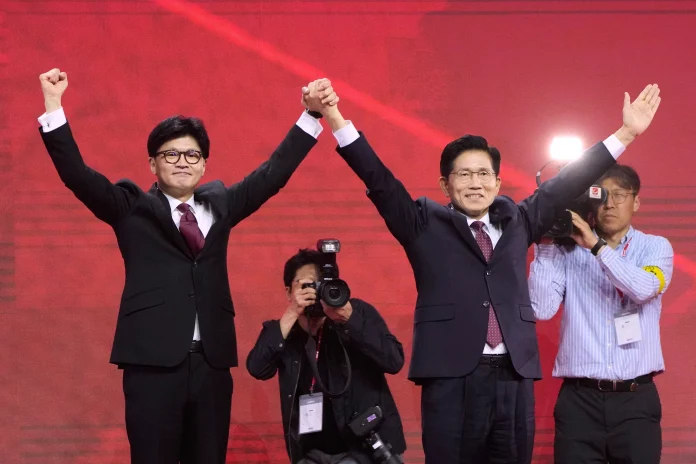South Korea’s conservative People Power Party (PPP) has taken the unusual step of replacing its presidential candidate just one week after his selection, highlighting growing internal tensions ahead of the 3 June presidential by-election.
The party annulled the primary result that had named Kim Moon-soo as its nominee, installing former Prime Minister Han Duck-soo in his place. The decision reflects ongoing disarray within the party following the recent impeachment and removal of former President Yoon Suk-yeol, who had faced criticism for attempting to impose martial law in December.
Internal pressure and a sudden change
Mr Kim, a former labour minister under Mr Yoon and known for his conservative stance, won the PPP’s primary on 3 May with 56.3% of the vote. He defeated a reform-minded challenger who had been critical of the martial law episode.
However, the party’s leadership—largely aligned with Mr Yoon—reportedly pressured Mr Kim to withdraw in favour of Mr Han, whom they consider a more competitive candidate against Lee Jae-myung of the liberal Democratic Party.
Mr Han, who briefly served as acting president following Mr Yoon’s impeachment, resigned from that role on 2 May to pursue a presidential run. He cited his extensive public service background as a key asset in addressing South Korea’s geopolitical and economic challenges, particularly in light of recent shifts in US policy under President Donald Trump.
Nomination controversy and party reactions
Following unsuccessful talks between Mr Kim and Mr Han to unite their campaigns, the PPP’s emergency committee formally rescinded Mr Kim’s nomination early on Saturday. Mr Han was then registered as a party member and confirmed as the new candidate. His appointment still requires ratification through an internal party vote on Saturday and final approval by the national committee on Sunday—the deadline for candidate registration.
In a statement released via the party, Mr Han expressed confidence in the PPP’s prospects, saying: “If we unite, we can surely win.”
Mr Kim, speaking at a press conference, criticised the move, claiming it marked the end of internal party democracy. He indicated he may pursue legal or political avenues in response, though it remains unclear whether he has a viable path to reinstate his candidacy without party support.
Election outlook and key rivals
Although Mr Kim had opposed Mr Yoon’s impeachment on 14 December, he distanced himself from the martial law decision announced on 3 December. He gained support among the party’s more hardline members after refusing to join other cabinet officials in a public apology over the issue.
Both Mr Kim and Mr Han have consistently trailed behind Democratic Party candidate Mr Lee Jae-myung in recent opinion polls. Mr Lee, who played a leading role in the efforts to remove Mr Yoon from office, mocked the PPP’s last-minute switch, saying: “I’ve heard of forced marriages, but never forced unity.”
Positioning himself as an anti-establishment figure, Mr Lee has pledged to address longstanding issues of inequality and corruption in South Korea. Critics, however, argue that his approach is divisive and warn that his presidency could heighten political polarisation. He is currently facing five trials related to corruption and other alleged offences, though a presidential victory would grant him immunity from most criminal charges during his term.
